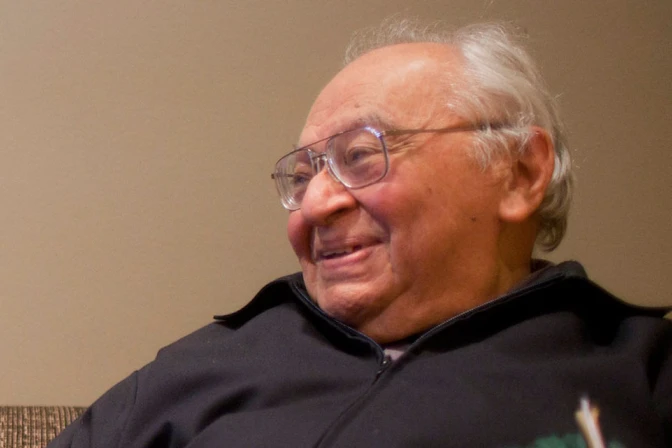Pope Francis, cardinals and other Catholic leaders from around the world remember Gustavo Gutiérrez Merino, a Peruvian Dominican priest who died on 22 October at the age of 96.
“Today I think of Gustavo Gutiérrez, a great man, a man of the Church who knew how to be silent when he had to be silent, who knew how to suffer when it was his turn to suffer, who knew how to carry forward so much apostolic fruit and so much rich theology. I think of Gustavo. Let us all pray for him together. May he rest in peace,” said Pope Francis in a video published by the Archdiocese of Lima (Peru) on 24 October.
“ Gustavo Gutiérrez is one of the great theologians of our century. I was already familiar with his major work, which rightly earned him the title of “father of liberation theology,” when I met him personally in 1988 in Lima, at the Bartolomé de Las Casas Institute,” said Cardinal Müller, prefect emeritus of the Congregation – now a Dicastery – in statements to the National Catholic Register.
“ Liberation theology in the true sense of the word is not a theology inspired by Marxism in the sense of ideological progressivism, but rather it raises the question of how we can speak of the love of God in the face of the misery of this world. God himself has made an option for the poor in Christ,” adds the German cardinal.
The cardinal also highlighted that Gutiérrez, author of Theology of Liberation: Perspectives (1971), “will go down in history as one of the great theologians and with his humility and sober but profound spirituality he will remain present in the memory of the Church with his thought but also with his intercession to God and his son Jesus Christ, of whom he was a faithful servant on earth.”
John Cavadini, a theologian at the University of Notre Dame (United States) who headed the Theology Department when Gustavo Gutiérrez was hired in 1999, remembers the Peruvian Dominican thus: “Unlike some liberation theologians, Fr. Gustavo was concerned with staying within the limits of the orthodox Catholic faith and ecclesiastical discipline.”
“As a result, it broadened ecclesial sensitivity in a way that permanently affected, one might say developed, Catholic social doctrine and, beyond that, its theological presuppositions,” the theologian added, in statements to the National Catholic Register.
In his view, Gutierrez’s option for the poor was “strictly speaking a theological teaching, not a sociopolitical teaching, although of course it had sociopolitical ramifications. What does God prefer? Are God’s preferences the same as ours? Does he also prefer high social status, wealth, and political influence as indicators of dignity and worth? Or does he prefer the human being as such, reduced only to himself, without these things?”
James Martin, the controversial Jesuit priest and founder of the pro-LGBTQ apostolate Outreach, remembered the “great Gustavo Gutiérrez” as “a towering figure in the life of the Church in the modern era. May he rest in peace.”
The Archbishop of Lima (Peru) and future cardinal, Monsignor Carlos Castillo, stated in a video: “On the day in which we celebrate the canonization of John Paul II, an evangelizing Pope and true pastor, we have also had the pain and joy of having lived so many years with Father Gustavo Gutiérrez, who has now gone to live in the Kingdom of the Father.”
Bishop Castillo also noted that Gustavo Gutiérrez “was a tireless defender of the preferential option for the poor, a phrase that he coined and that was integrated into the Magisterium of the Church as a fundamental path to live our faith.”
The Jesuit Cardinal Pedro Barreto, Archbishop Emeritus of Huancayo (Peru), recalled to Vatican News a meeting he had with Gutiérrez a few months ago: “He told me that he had lived through difficult times and I am very aware of that, but he was very much at peace and had a lot of hope.”
The cardinal recounted that during that meeting, he placed his pectoral cross on Gutiérrez as a spontaneous gesture. It was an “expression of what he, out of fidelity to the Church, suffered inside: he lived the passion of Christ in the Church with these insults, these denials that some sectors of the Church and outside of it made.”
A note from ADN Celam, the information body of the Latin American Episcopal Council (CELAM), states that “Gustavo Gutiérrez Merino was criticized for his clear distance from orthodoxy, which earned him a direct association with Marxism.”
“The election of Pope John Paul II in 1978, his Polish origin and extensive knowledge of the Soviet threat, as well as the election of Ronald Reagan as President of the United States in 1980, were events that marked this struggle and stigmatization against liberation theology and the voices of its greatest representatives,” the text adds.
“In 2004, the Holy See concluded what it called a process of clarification on the points it found problematic in some of the works of the Peruvian theologian,” the note continues.
ADN Celam then points out that in 2015, at an event organized by Fordham University, Gustavo Gutiérrez said that “liberation theology (…) is against Marxism because for Marx Christianity was oppression and my life’s work is committed to the idea that Christianity is liberation.”



